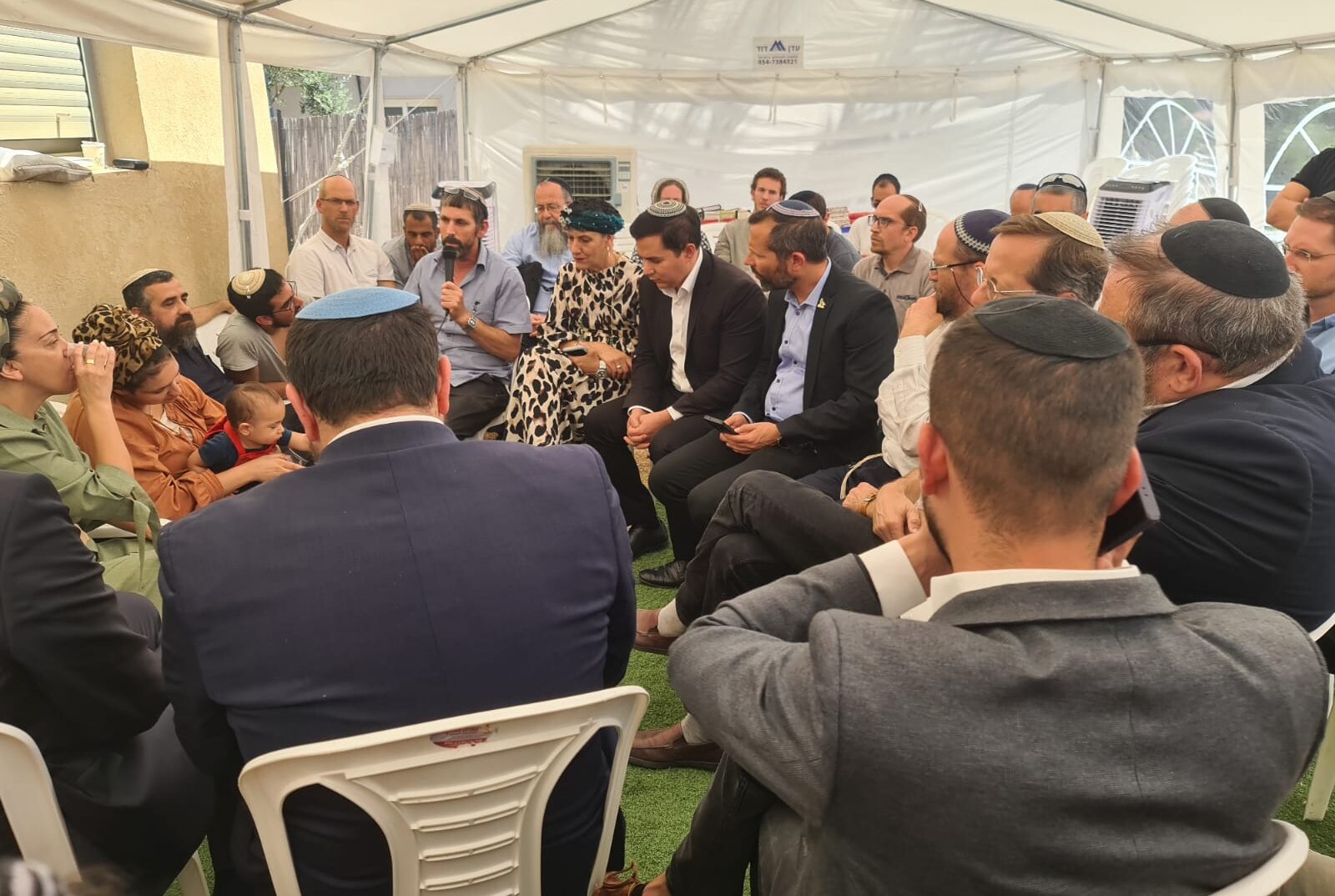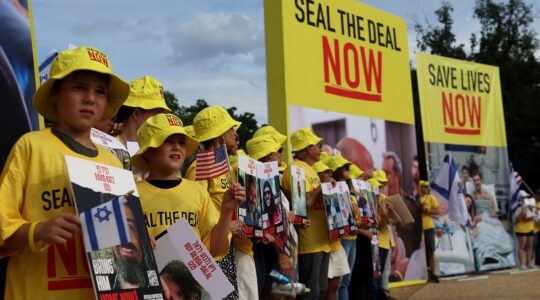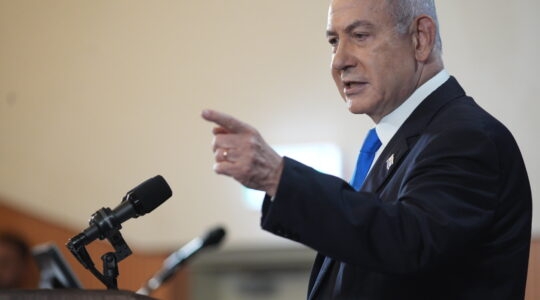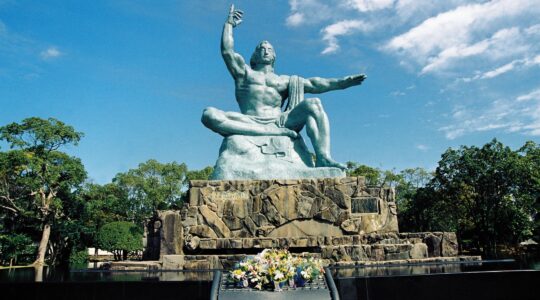ELI, West Bank — A cluster of balloons, one of them shaped like the number one, stood outside of the mourners’ tent at the Dery home in the West Bank settlement of Eli.
The balloons were for Yinon, who celebrated his first birthday on Monday, in his father’s absence.
His father, Saadia Dery, was one of two soldiers killed in Gaza on Thursday. Saadia was a sergeant major in the reserves. He was also my son’s aide, so four days later, I came to pay my respects to his family.
I had no idea that it would also be the day that Prime Minister Benjamin Netanyahu, and a host of ministers in his coalition, would choose to do the same.
When the prime minister arrived, he was greeted by Refael Arvas, the father of combat medic Shay Arvas, who was killed in Gaza at the start of the war.
“Saadia is the 20th fallen soldier in the same burial plot as my son since this war began,” Arvas told Netanyahu. “I light memorial candles for all of them, every day. I call them all my children.”
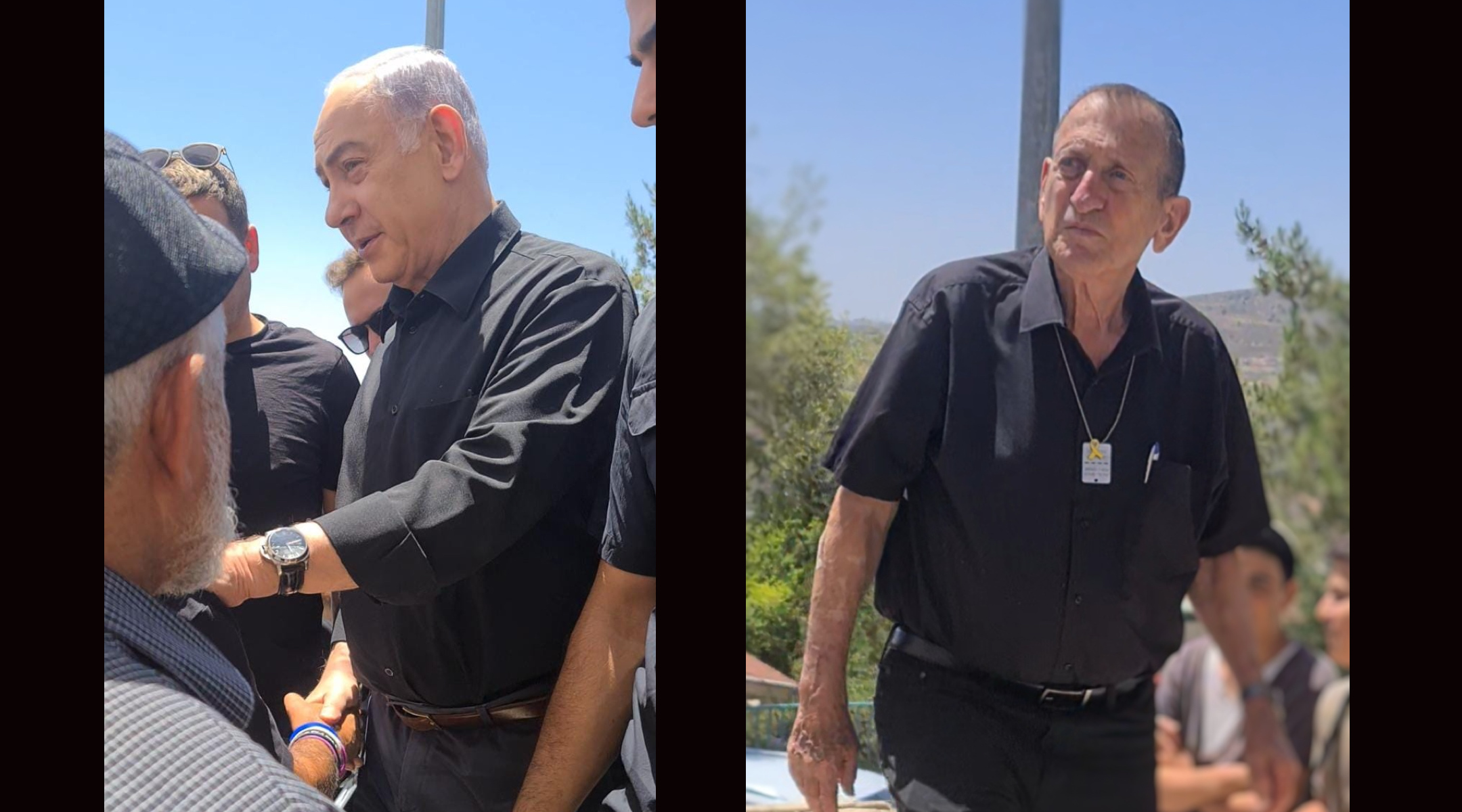
Israeli Prime Minister Benjamin Netanyahu greets Refael Arvas, the father of a fallen soldier, at the shiva of Saadia Dery in Eli, West Bank, June 25, 2024. At right, Tel Aviv Mayor Ron Huldai arrives at the mourning tent. (Deborah Danan)
Arvas and Dery are buried in Holon Military Cemetery. It was there on Friday that I first heard Dery’s mother, Laly, issue a sharply worded rebuke to Israel’s leaders during her eulogy for her son.
“I paid the highest price possible for the right to scream at our leadership: When will you reach the heights of our fallen heroes? When will the gap close between this nation and its leaders? You owe us this!”
She also lamented the fact that haredi Orthodox men are not subject to Israel’s mandatory draft. “Saadia, my precious son. You proved that there’s no contradiction between the Torah and the privilege to serve the IDF,” she said. “It’s not sharing the burden, it’s sharing the privilege.”
One day before his death, Laly took to Facebook to write an eerily prescient post discussing fallen soldiers and how the haredi, or ultra-Orthodox, sector cannot understand the pain that families endure.
“Every soldier has circles — parents and siblings, spouse and children, neighbors and students, classmates and the school — around them, all of which are profoundly affected when the soldier is killed or wounded. From that moment on, their lives will never be the same,” she wrote. “The only real way to …. share in their sorrow and rejoice in their joyful moments, comes from a deep understanding of what they are going through, from an honest experience that these things directly affect me as well.”
In the tent on Tuesday, Laly went a step further, just as news of a landmark High Court ruling mandating military service for haredi yeshiva students emerged. A semi-circle of government ministers surrounded her, her husband Chaim, Saadia’s widow Racheli, and the couple’s baby.
“We have a profoundly difficult debate with the haredi public regarding the draft, but I will do everything to find favor in their eyes, and I will try very, very hard to understand where they’re coming from,” she said.
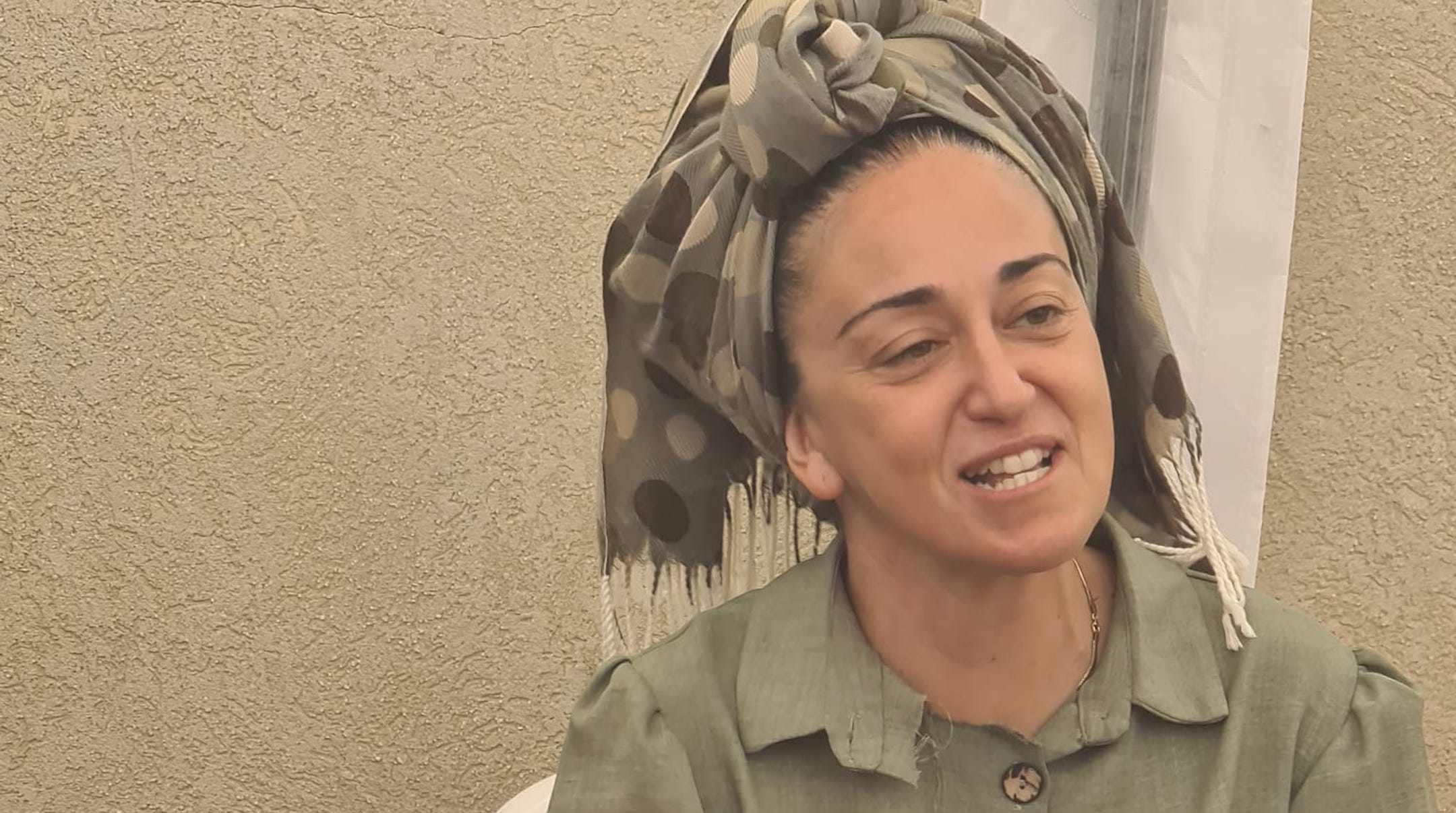
Laly Dery, the mother of a soldier killed in Gaza, lashed out at some of the same government lawmakers she has supported in the past when they paid a shiva call to her West Bank home, June 25, 2024. (Deborah Danan)
Addressing the lawmakers, she went on: “The people are desperately looking to you to see you embrace one another, and end your pettiness. It doesn’t mean you have to give up on what you believe. It’s possible to be both firm and soft.”
Chaim also echoed Laly’s supplications but contrary to his wife, who in the past ran in the Likud primaries and is a prominent media personality, the older Dery said he was not schooled on the key players in politics.
He asked Communications Minister Shlomo Karhi to remind him of his name before continuing, “When someone in the opposition speaks about Shlomo Karhi, he’ll say, ‘I don’t agree with him’ — and that disagreement should be noted in the Knesset protocols — ‘but wow, what love there is between us.’”
“When you are faced with matters that pertain to our very existence, you have to come from a place of unity,” he said.
He also addressed Racheli, who like many Israeli women has spent long stretches of time since Oct. 7 without her husband. “Racheli, you worried so much over Saadia while he was there,” Chaim said. “Now you won’t have to worry any more.”
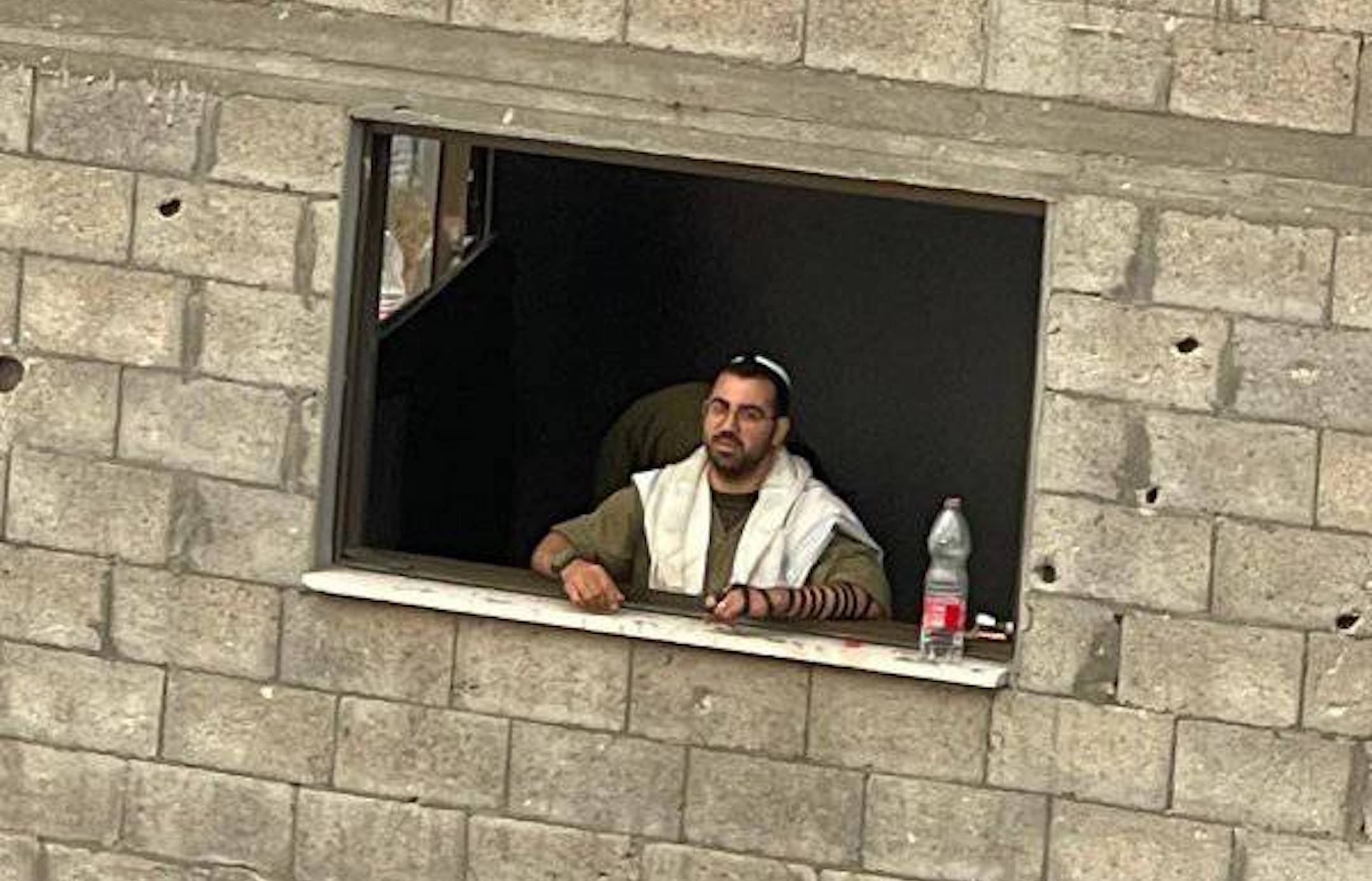
Saadia Dery was photographed praying in Gaza the morning before he was killed there, in a photograph that went viral after his death. (Facebook)
A lull in the conversation allowed me to make my way to Laly and present myself. I told her that for months, Saadia would appear at my house, twice a day, to take my 6-year-old autistic son to and from school.
I said that the image of her sweet, sweet son with his ever-present smile holding my son’s hand will never leave my mind.
I knew him only as endlessly patient, humble and unassuming. But until I heard the eulogies at the funeral, I didn’t realize the giant he was.
Laly, tears streaming down her face, clasped my hands in hers.
She thanked me for giving her another example of how her son showed utter dedication to the particular task at hand and to all of his many different roles in life: father, husband, university student, yeshiva student, employee, bar mitzvah teacher and special education aide.
“Please God you should find another aide just as patient and dedicated as he was,” she said.
But I told her that we already had another aide.
“Before he left, Saadia found us a replacement — a wonderful fellow yeshiva student — because,” at this point, fresh tears began to flow, “he said he didn’t know when he would be back this time around.”
